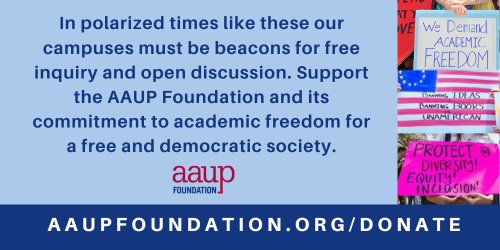Dear John,
I’m writing to ask you to consider a year-end gift to the AAUP Foundation, the AAUP’s educational and charitable arm and an important source of support for initiatives and programs that we can’t fund with membership dues alone. The Foundation’s mission of protecting and promoting academic freedom and autonomy in higher education feels especially urgent this year. Ongoing political and legislative interference is an existential threat to all US colleges and universities. Educational gag orders abound; diversity, equity, and inclusion offices are shuttered; and faculty members, students, and student groups are being disciplined or sanctioned for speaking out about the Israel-Hamas war. It is especially in polarized times like these that our campuses must be beacons for free inquiry and open discussion of all matters. We must safeguard the rights of faculty members and students to speak, write, and protest on controversial topics both on and off campus. Our job is to protect academic freedom and to ensure higher education remains a public good for our society and its people. It’s going to take all of us to preserve our profession and the academy. Higher education as a public good is a fragile commodity, and it remains strong only to the extent that those of us in higher education fight to maintain it.
Make your tax-deductible 2023 donation to support our work in 2024!
In 2023, the AAUP Foundation supported several initiatives fighting back against efforts to silence educators and undermine their autonomy. One of our grants went to Historians for Peace and Democracy, part of the Zinn Education Project’s “Historians-on-Call” network. This project is funding an organizer to connect K–12 teachers, parents, and community activists with faculty historians in order to push back against racist legislative whitewashing of US history. Another grant went to the AAUP state conference in Louisiana for a workshop, led by Professor Bethany Letiecq of George Mason University, on proposed state legislation that would impose educational gag orders and undermine tenure, with participants producing and circulating a resolution that attracted statewide media attention. The Foundation also covered costs for the AAUP’s panel presentation at the South by Southwest EDU Conference in Austin, Texas. AAUP Council member Glinda Rawls, AAUP members David Rabban and Jennifer Ruth, and I, in my role as AAUP president, provided a broad overview of educational gag orders being considered or passed in state legislatures and discussed the variety of work being done by higher education faculty members to resist and defeat such legislation. All these initiatives reflect the AAUP Foundation’s commitment to academic freedom as a cornerstone of a free and democratic society.
Join the fight against outside interference in higher education.

As a supporting organization of the AAUP, the AAUP Foundation helps to cover costs for some of the Association’s signature work, including publication of the annual Journal of Academic Freedom—with this year’s volume focusing on the “radically changed” landscape of higher education undermined both by external interference and self-censorship; preparation of friend-of-the-court briefs in legal cases that have a significant impact on higher education, such as those that examined race-conscious admission policies at Harvard University and the University of North Carolina and resulted in a deeply disappointing decision by the US Supreme Court; and investigations into violations of principles of academic freedom and shared governance. Last year’s groundbreaking special report Governance, Academic Freedom, and Institutional Racism in the University of North Carolina System detailed patterns of political pressure and influence that contributed to jeopardizing academic freedom, eroding faculty participation in governance, and reinforcing the persistent institutional racism that makes campuses unwelcoming to faculty, staff, and students of color. The Foundation’s support for the report and the joint resolution issued in response to it by the AAUP’s Committee on Historically Black Institutions and Scholars of Color, Committee on College and University Governance, and Committee A on Academic Freedom and Tenure helped the AAUP to set an important precedent for addressing issues of systemic and institutional racism that cut across campus boundaries. The AAUP has continued with this broad approach, aiming to conduct all of its work through a racial equity lens and releasing just this week the final report of our Special Committee on Academic Freedom and Florida, Political Interference and Academic Freedom in Florida’s Public Higher Education System. This is a thoroughly researched, well-documented review illustrating an alarming pattern of politically, racially, and ideologically motivated attacks on public higher education in Florida and a call to action to fight tooth and nail against these incursions in Florida and beyond.
Your contribution will help the AAUP Foundation and the AAUP to make a difference.
The AAUP Foundation offers support for conferences and professional development on principles of academic freedom or shared governance and offers financial assistance to individual faculty members harmed by violations of those principles. It has provided funding for the ongoing, multiyear Faculty First Responders project, developed by Trinity College political science professor Isaac Kamola to monitor partisan news coverage intended to stir up outrage that will lead to online harassment of faculty members—particularly those whose teaching and research focus on issues of race or gender—and to reach out to targeted faculty members, often before they know they are targeted, to offer assistance and to train more faculty members and administrators to fight back against targeted harassment.
We are proud of the AAUP Foundation’s important contributions to the academic profession and the work it enables. Your gift of any amount will help to continue and expand that work.
Please join me in supporting the AAUP Foundation!
Sincerely,
Irene Mulvey
President, AAUP and AAUP Foundation
P.S. If you prefer to donate by mail, please make a check payable to "AAUP Foundation" and send to:
AAUP Foundation
555 New Jersey Avenue NW, Suite 600
Washington DC 20001